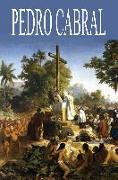Pedro Cabral
BücherAngebote / Angebote:
The biography of Pedro Cabral (c1467 - c1520), the Portuguese commander of a fleet of ships whose epic voyage to India led to the first crossing of the South Atlantic, the discovery of Brazil, the discovery of Madagascar, and trade between Europe and Asia around Africa.
Pedro Álvares Cabral was born in Portugal, probably in 1467. When Vasco da Gama returned from India in 1499, King Manuel I chose Pedro Cabral to sail a fleet of ships to establish trade with India.
Pedro Cabral's fleet was one of the largest fleets that had ever sailed the Atlantic. It set sail for India in 1500 on what turned out to be the longest voyage in history up to that time, and one of the greatest and most influential voyages of discovery ever made.
After passing Cape Verde Islands, Pedro Cabral's fleet took a south westerly course, which led to them inadvertently becoming the first ships to sail across the South Atlantic. On shore they encountered strange people with bodies painted and tattooed, and decorated with coverings of brilliant feathers. Their appearance and customs were entirely unlike any that the Portuguese had seen before. Pedro Cabral had discovered Brazil, writing the first page in its history, and had opened up South America to further discoveries.
The continuation of their voyage led Pedro Cabral's men to be the first to sail from America to India. They discovered Madagascar, and were the first Europeans to travel to parts of East Africa and the Middle East by the southern route. Their epic voyage continued despite considerable loss of lives and ships.
Included are all of the first hand accounts of the journey, written by Pero Vaz de Caminha, Master John, and "the anonymous narrative", and all of the reports written on their return by King Manuel, Amerigo Vespucci, Bartolomeo Marchioni, Ca' Masser, and those that appeared in "The Venetian letters" and the "The Venetian diaries".
This voyage was the beginning of trade between Europe and the East by the Atlantic route, causing the eventual decline of the prosperity of those nations that had conducted trade with Asia via the existing routes. Few voyages or discoverers have been of greater importance to posterity, yet few have been less appreciated in their time.
Folgt in ca. 15 Arbeitstagen
